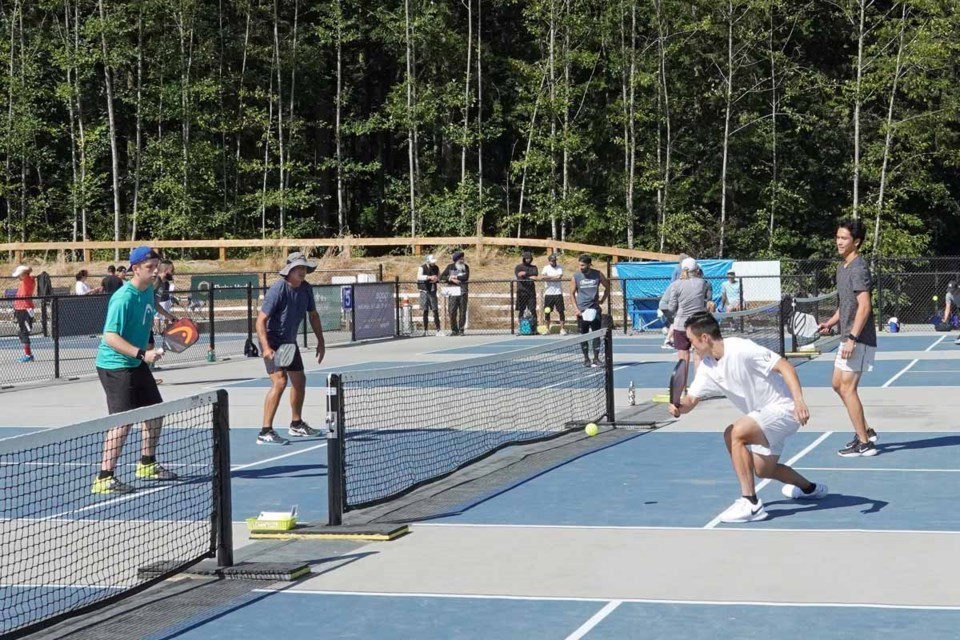No one knows when pickleball first landed in Richmond, but the sport has exploded in popularity in the city.
According to co-founder Gordon Farrell, the Richmond BC Pickleball Association’s (RBCPA) membership has grown from around 100 to almost 600 since it was established in 2019.
Farrell came to learn about the sport through word of mouth a few years ago when pickleball enthusiasts played at community centre gyms during “sporadic times of the day.”
The lack of dedicated courts or even outdoor courts never stopped the enthusiasts, and the high demand and desire to bring the sport to the city’s attention were what inspired the formation of RBCPA.
“They’d have sessions in a community centre that would be for a couple of hours and they’d only let 30 people in just because you can only have so many people playing,” said Farrell.
“But 60 to 70 people would line up an hour before to get in. And you could show up and not get to play that day.”
The city eventually took note of the pickleball hype and managed to convert nine dedicated outdoor pickleball courts by 2020 — just in time for the COVID-19 pandemic.
What is pickleball?
According to the Pickleball Hall of Fame, the sport came into existence in 1965 when a group of kids was told to make up a game on a rainy day at Bainbridge Island, Washington. Armed with various broken racquets, ping pong paddles and a Wiffle ball, the kids began bouncing the ball across a badminton court and volleying it over a net.
Three dads, Joel Pritchard, Bill Bell and Barney McCallum, saw how much their children enjoyed the made-up game and got to work to make it into a sport that could be enjoyed by the entire family.
A simple way to describe the game, according to Farrell, is that you’re playing table tennis while standing on a big table.
“So, the ball moves and has the same sort of sounds, and the paddles are similar but much larger,” he added.
The result is an addictive and strategic game that isn’t as physically demanding as similar sports such as tennis or racquetball.
“It’s a bit like a game of chess. You don’t have to be physically super fast to be able to outmaneuver somebody younger than you on the courts. It’s just about your style and foresight,” Farrell explained.
Why is it so popular?
Richmond is only one of the many cities across B.C. experiencing the pickleball boom. One major factor contributing to the sport’s popularity is the COVID-19 pandemic, according to Farrell.
“We were lucky that in 2020, the courts were finished,” he said. “With the pandemic, you couldn’t do anything anywhere like travel (and) all the community centres were closed. So that really helped pick up the sport because people had something to do.”
The sport is also inherently inclusive: it’s a good cardio workout and requires strategy but puts less stress on one’s body, allowing players of all ages, especially seniors, to participate.
In fact, Farrell has noticed that people who have played other sports such as squash, racquetball and tennis often choose to pivot to pickleball as they get older.
Pickleball games are more social as well, according to Farrell, as the learning curve is quick and games can be short, and players can enjoy the game even when they’re playing with people on different skill levels.
“And unlike a tennis court, (where) you’re 150 feet away from the other player, (and) unless you’re screaming, you can’t even have a conversation, pickleball’s court is about a fourth the size of a tennis court,” he added.
“So you’re able to talk as you’re playing back and forth, and it’s much more fun and laughing.”
The installation of dedicated pickleball courts was also helpful for introducing it to the local community, and it is affordable as well, since all people need are a paddle and a ball.
Next step: more courts and more students
As of now, Richmond has yet to have a pickleball league due to the lack of courts.
“We need about 12 courts and at least a location to be able to run (the tournaments) because they usually go over a weekend,” Farrell explained.
The city hasn’t allocated any funding for the sport recently due to high funding demand across the board for sports in Richmond, but Farrell is hopeful that the sport will continue to grow in the city.
Other community members, such as Cambie secondary teacher Linda Wong, are also trying to spread the word about the sport. Pickleball is currently offered in Richmond schools during P.E. lessons, but many students remain unaware of the sport and there are no pickleball teams as of now.
“I would love to bring in some of the community on a volunteer basis. And when the P.E. department does their pickleball unit, I would love to have some of these senior experts come in and just mentor these kids and just play (with) them,” she said.



